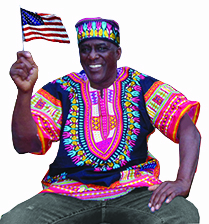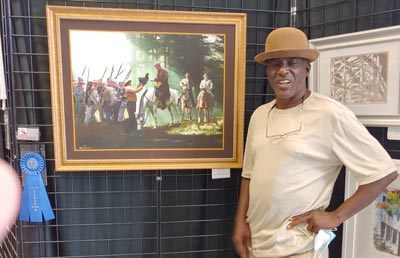ARTIST
STATEMENT

Greetings! I am Gregory Newson, a trailblazing artist-writer. But rest assured, my journey here has sometimes been about wielding the brush or pen. Today, you witness the magnificent synthesis of many of life's extraordinary encounters. So, you might be wondering, What precisely is my captivating story?
My birthplace was Harlem, New York, in 1948, but my roots trace back to the rich soil of Jacksonville, Florida, where my ancestors were once enslaved. As a child, I grappled with undiagnosed dyslexia, a challenge that hardly garnered attention in those times. Naturally, this dyslexia posed hurdles in my education, making reading and writing a formidable task. Yet, there was another facet to my experience with dyslexia: it fueled my determination to stand up against classroom bullies, often resulting in my expulsion.
Despite my apparent challenges in learning, I possessed an extraordinary gift. Amidst my struggles, one subject illuminated my path—art. Remarkably, even though I was frequently ejected from various classes, my art teacher keenly recognized my innate talent. She boldly entered me into art shows, where I participated and triumphed, clinching 1st prizes.
Yet, the pinnacle of my early life arrived when a generous philanthropist named Norman Rockwell extended a scholarship to me. The magnitude of this moment was nothing short of profound. I was thrust into radio interviews, basking in the spotlight's glow. The Amsterdam News, a venerable publication, even featured my story, boldly emblazoning its pages with the headline, "Harlem Boy is a Promising Genius."
"I can't wait to embark on a unique journey soon" was a will I always had at heart that led me to align myself with inspiring ideals like those of the Black Panther Party during the vibrant era of the late '60s and early '70s. However, this choice led me to temporarily stow away my cherished dreams of artistic expression, which had once garnered me scholarships and accolades. It's crucial to realize that, at the time, popular narratives that cast doubt on my ability to succeed as a painter within the constraints of societal expectations influenced me.
In those days, the notion persisted that painting was an exclusive domain, seemingly reserved for a select few, largely belonging to the white community. As a “nigga”, venturing into this territory often drew incredulous reactions within my community. It was as if the concept of a black artist wielding a brush was seen as nothing short of a whimsical jest.
And so, reluctantly, I put my brushes aside for a time. But as you'll soon discover, this was just a chapter in my ever-evolving story.
As a young black teenager in my tight-knit community, financial resources were often scarce, prompting me to make some ill-advised choices in pursuit of money. I found myself entangled in a life of crime, resorting to drug sales as a means to an end. Predictably, this unfortunate path eventually led me to prison bars.
Now, I can almost hear you chuckling and shaking your head, thinking, "How could anyone be so naive?" And you'd be right; my actions were indeed foolish, and my life had taken a drastic turn for the worse. But, as fate would have it, God had a different script in mind for my life. Can I get an 'Amen'?
Upon my release from prison, I relocated to Jacksonville, where I discovered a small, supportive community church that became an anchor for my newfound sobriety. Here, I delved into the intricate realm of victim mentality, challenging my thinking patterns and striving for personal growth. Yet, despite these transformative experiences, one crucial element was still missing from my life—I had yet to pick up my paintbrush again.
You might be wondering, what rekindled my passion for painting? It all began with an unexpected encounter with history's rebel, Stonewall Jackson. This Confederate officer did something remarkable – defied Virginia law to teach black individuals how to read the Bible and assembled an army of over 3,000 black people. The moment I stumbled upon his remarkable story, my perspective shifted.
I realized that countless stories within the black community had remained buried, their narratives waiting to be unearthed and shared. This revelation ignited an insatiable curiosity within me. I delved into extensive research, unearthing the stories of black Confederates that had long been overlooked.
The result of this newfound inspiration? My return to the canvas, but this time with an unwavering sense of purpose and crystal-clear vision. I knew precisely what I wanted to paint, who my art was intended for, and the stories I was determined to illuminate. So, I started painting again and wrote my first graphic novel book, “Stonewall Jackson and the Uppity Spy,” plus launch a publishing company named Newson Publishing and a book series named “CSA Buried Treasures.” I became determined to understand that “Nothing is holding me down but gravity and lack of hard work.”
So, I plan to highlight slaves of the lost cause who exhibited extraordinary character.
The Principle of Polarity, first introduced by ancient mystics, teaches us that everything has two opposing aspects or poles. For example, North and South, black and white. However, within this duality, there are often shades of gray, where distinctions become blurred, and we experience emotions such as love and hate that may sometimes exist in the ambiguous space between "like" and "dislike."
It’s Time That Americans to Cease Acting like Victims.
My mission has been to shed light on the often-overlooked middle ground within the American Civil War and the complex issue of slavery. Rarely acknowledged, this middle polarity reveals that there was no fundamental difference between the North and the South—they both relied on slavery. Since the war's conclusion, our nation has grappled with the enduring effects of this conflict, akin to a prolonged "Withdrawal." Having battled my own internal Civil War for far too long, I've come to define it as a spiritual struggle. I've grown increasingly skeptical of two subjects: science and history. I believe that the victors of conflicts shape a significant portion of science and the prevailing narratives of history. Post-victory, they strive to maintain dominance by controlling education and influencing future generations.
For instance, we're commonly taught that the Civil War was fought to abolish slavery. Yet, have you ever heard of Abraham Lincoln's Corwin Amendment? Lincoln proposed to the Southern states that they could retain their slaves if they rejoined the Union. The Civil War wasn't solely about ending slavery but also about economic interests, as Lincoln faced the exodus of cotton revenue from the seceding states.

It's high time we acknowledge the significant role played by black Confederates in forcing Abraham Lincoln's hand to issue the Emancipation Proclamation. We ought to erect monuments honoring these so-called mythical southern black Confederate soldiers instead of perpetuating the false narrative that they were limited to menial roles such as orderlies, teamsters, cooks, body servants, and flunkies.
